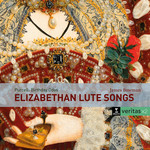
Elizabethan Lute Songs / Purcell: Birthday Odes for Queen Mary
 $25.00
Special Order
$25.00
Special Order3 - 6 weeks add to cart
WILLIAM BYRD / JOHN DOWLAND / HENRY PURCELL / etc
Elizabethan Lute Songs / Purcell: Birthday Odes for Queen Mary
Norma Burrowes (Soprano), James Bowman & Charles Brett (Countertenors) / Robert Lloyd (Bass) / Early Consort of Music / David Munrow
[ Erato Veritas / 2 CD ]
Release Date: Friday 1 February 2019
This item is only available to us via Special Order. We should be able to get it to you in 3 - 6 weeks from when you order it.
Countertenor James Bowman (b.1941) enjoyed a long association with early English song, an interest which bore fruit with this 1972 recording of Elizabethan lute songs, here making its first appearance on CD. Together with the lutenist Robert Spencer, Bowman arranged the programme to reflect the repertory of the theatre and court and the career of John Dowland, with a final homage to Italy, the cradle of early song. The recordings of Purcell's Birthday Odes date from 1975. Between 1689 and 1694, Henry Purcell produced an annual ode for the celebration of Queen Mary's birthday. The last and best known is Come, Ye Sons of Art, which drew on the composer's recent successes in the theatre by employing a larger orchestra than usual (with trumpets, oboes and recorders) and giving the chorus a more prominent role.
From the late 1960s the countertenor James Bowman was at the forefront of the early music revival. He made his London debut at the Queen Elizabeth Hall in 1967 and enjoyed a decade of work with David Munrow and the Early Music Consort, later collaborating with Christopher Hogwood and the Academy of Ancient Music. In the early 1970s Bowman and the Early Music Consort made ground-breaking recordings of Medieval and Renaissance music, also pioneering historically accurate practice in music of the 17th century, notably with the album 'Monteverdi's Contemporaries' (1976).
"These two birthday odes from the 1690s, Come ye sons of art away and Love's goddess sure, were recorded in 1975, when Purcell was still largely the preserve of British musicians, David Munrow was the uncrowned king of early music in Britain (he shocked the world by taking his own life a year later at the age of 33), and James Bowman was the counter tenor of the moment. To modern ears these performances sound rather more middle-of-the-road than you might expect, an indication of how period players' responses have developed over the years in expressive detailing and control of colour. The solo singing, however, is strong, and the music represents Purcell at his finest - the counter tenor duet "Sound the trumpet" (Bowman and Charles Brett) never palls." (Irish Times on the Purcell)
Recorded 1976
Tracks:
O mistress mine
Take, O take those lips away
Gray's Inn Masque
Wilson's Wild
The Willow Song
Melancholy GaIliard (Dowland)
Full fathom five
Where the bee sucks
Care-charming sleep
Eliza is the fairest Queen
The noble famous Queen
Gaiarda la Royne d'Escosse
The Queen's Galliard
Miserere, my Maker
Away with these self-loving lads (Dowland)
Lasso vita mia (Dowland)
Lachrimae, or Seven Tears: No. 21, Mr. George Whitehead his Almand (Dowland)
Now, O now, I needs must part (Dowland)
In darkness let me dwell (Dowland)
Se l'aura spira spira tutta vezzosa (Frescobaldi)
Morto son io (Busatti)
Fantasia for lute (Galilei)
Tortorella (Pietragrua)
So ben mi c'ha bon tempo (Vecchi)
PURCELL:
Birthday Odes
1. Symphony
2. Come Ye Sons Of Art Away
3. Sound The Trumpet
4. Come Ye Sons Of Art Away
5. Strike The Viol
6. The Day That Suck A Blessing Gave
7. Bid The Virtues
8. Theses Are The Sacred Charms
9. See Nature Rejoicing
10. Symphony
11. Love's Goddess Sure
12. Thoes Eyes, That From, That Lofty, Mein
13. Sweetness Of Nature
14. Long May She Reign
15. May Her Blest Example
16. Many Such Days
17. May She To Heaven
18. As Much As We Below Shall Mourn
